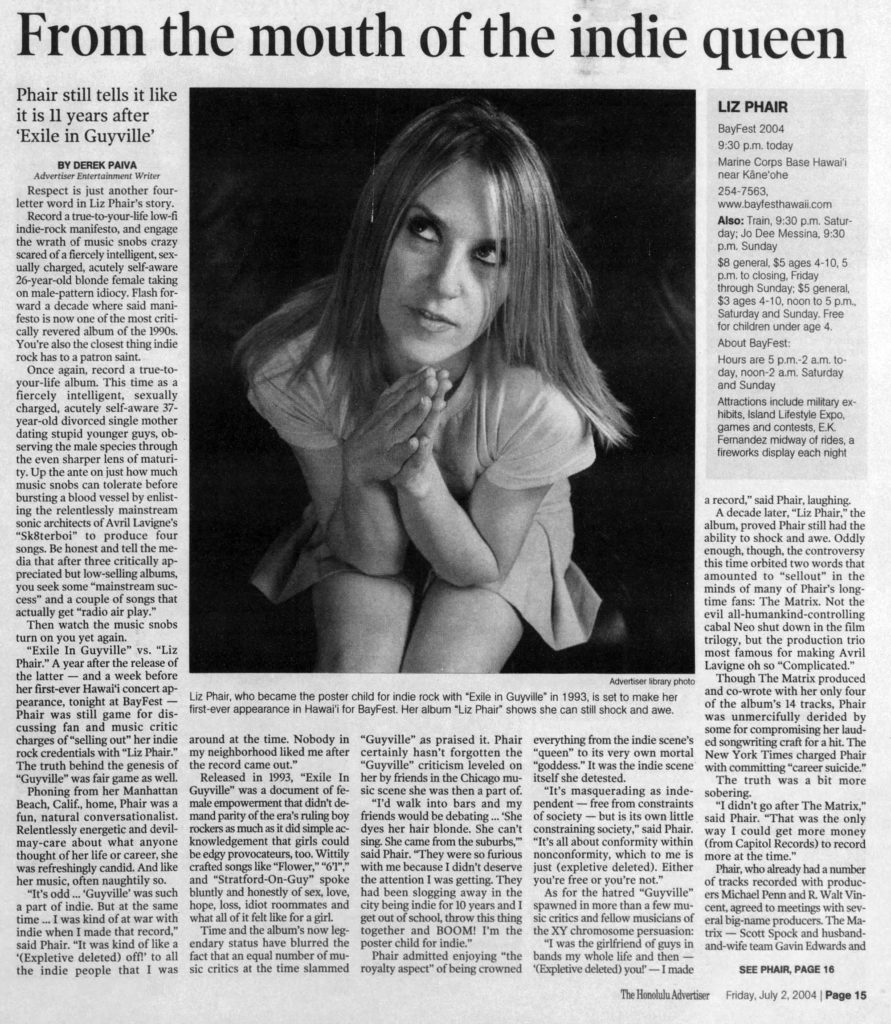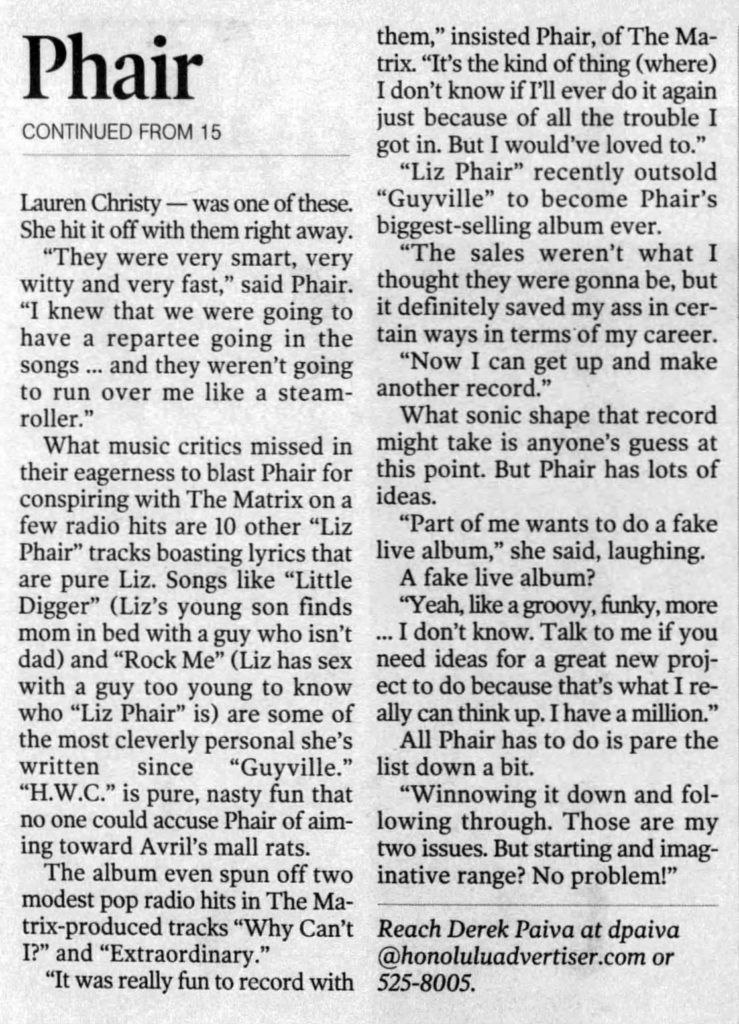By Derek Paiva
The Honululu Advertiser, July 2, 2004
Respect is just another four-letter word in Liz Phair’s story.
Record a true-to-your-life low-fi indie-rock manifesto, and engage the wrath of music snobs crazy scared of a fiercely intelligent, sexually charged, acutely self-aware 26-year-old blonde female taking on male-pattern idiocy. Flash forward a decade where said manifesto is now one of the most critically revered album of the 1990s. You’re also the closest thing indie rock has to a patron saint.
Once again, record a true-to-your-life album. This time as a fiercely intelligent, sexually charged, acutely self-aware 37-year-old divorced single mother dating stupid younger guys, observing the male species through the even sharper lens of maturity. Up the ante on just how much music snobs can tolerate before bursting a blood vessel by enlisting the relentlessly mainstream sonic architects of Avril Lavigne’s “Sk8terboi” to produce four songs. Be honest and tell the media that after three critically appreciated but low-selling albums, you seek some “mainstream success” and a couple of songs that actually get “radio air play.”
Then watch the music snobs turn on you yet again.
Exile In Guyville vs. Liz Phair. A year after the release of the latter — and a week before her first-ever Hawai’i concert appearance, tonight at BayFest — Phair was still game for discussing fan and music critic charges of “selling out” her indie rock credentials with Liz Phair. The truth behind the genesis of Guyville was fair game as well.
Phoning from her Manhattan Beach, Calif., home, Phair was a fun, natural conversationalist. Relentlessly energetic and devil-may-care about what anyone thought of her life or career, she was refreshingly candid. And like her music, often naughtily so.
“It’s odd… Guyville was such a part of indie. But at the same time… I was kind of at war with indie when I made that record,” said Phair. “It was kind of like a ‘(Expletive deleted) off!’ to all the indie people that I was around at the time. Nobody in my neighborhood liked me after the record came out.”
Released in 1993, Exile In Guyville was a document of female empowerment that didn’t demand parity of the era’s ruling boy rockers as much as it did simple acknowledgement that girls could be edgy provocateurs, too. Wittily crafted songs like “Flower”, “6’1″”, and “Stratford-On-Guy” spoke bluntly and honestly of sex, love, hope, loss, idiot roommates and what all of it felt like for a girl.
Time and the album’s now legendary status have blurred the fact that an equal number of music critics at the time slammed Guyville as praised it. Phair certainly hasn’t forgotten the Guyville criticism leveled on her by friends in the Chicago music scene she was then a part of.
“I’d walk into bars and my friends would be debating… ‘She dyes her hair blonde. She can’t sing. She came from the suburbs,'” said Phair. “They were so furious with me because I didn’t deserve the attention I was getting. They had been slogging away in the city being indie for 10 years and I get out of school, throw this thing together and BOOM! I’m the poster child for indie.”
Phair admitted enjoying “the royalty aspect” of being crowned everything from the indie scene’s “queen” to its very own mortal “goddess.” It was the indie scene itself she detested.
“It’s masquerading as independent — free from constraints of society — but is its own little constraining society,” said Phair. “It’s all about conformity within nonconformity, which to me is just (expletive deleted). Either you’re free or you’re not.”
As for the hatred Guyville spawned in more than a few music critics and fellow musicians of the XY chromosome persuasion:
“I was the girlfriend of guys in bands my whole life and then — ‘(Expletive deleted) you!’ — I made a record,” said Phair, laughing.
A decade later, Liz Phair, the album, proved Phair still had the ability to shock and awe. Oddly enough, though, the controversy this time orbited two words that amounted to “sellout” in the minds of many of Phair’s longtime fans: The Matrix. Not the evil all-humankind-controlling cabal Neo shut down in the film trilogy, but the production trio most famous for making Avril Lavigne oh so “Complicated”.
Though The Matrix produced and co-wrote with her only four of the album’s 14 tracks, Phair was unmercifully derided by some for compromising her lauded songwriting craft for a hit. The New York Times charged Phair with committing “career suicide.”
The truth was a bit more sobering.
“I didn’t go after The Matrix,” said Phair. “That was the only way I could get more money (from Capitol Records) to record more at the time.”
Phair, who already had a number of tracks recorded with producers Michael Penn and R. Walt Vincent, agreed to meetings with several big-name producers. The Matrix — Scott Spock and husband-and-wife team Gavin Edwards and Lauren Christy — was one of these. She hit it off with them right away.
“They were very smart, very witty and very fast,” said Phair. “I knew that we were going to have a repartee going in the songs… and they weren’t going to run over me like a steamroller.”
What music critics missed in their eagerness to blast Phair for conspiring with The Matrix on a few radio hits are 10 other Liz Phair tracks boasting lyrics that are pure Liz. Songs like “Little Digger” (Liz’s young son finds mom in bed with a guy who isn’t dad) and “Rock Me” (Liz has sex with a guy too young to know who “Liz Phair” is) are some of the most cleverly personal she’s written since Guyville. “H.W.C.” is pure, nasty fun that no one could accuse Phair of aiming toward Avril’s mall rats.
The album even spun off two modest pop radio hits in The Matrix-produced tracks “Why Can’t I?” and “Extraordinary.”
“It was really fun to record with them,” insisted Phair, of The Matrix. “It’s the kind of thing (where) I don’t know if I’ll ever do it again just because of all the trouble I got in. But I would’ve loved to.”
Liz Phair recently outsold “Guyville” to become Phair’s biggest-selling album ever.
“The sales weren’t what I thought they were gonna be, but it definitely saved my ass in certain ways in terms of my career.
“Now I can get up and make another record.”
What sonic shape that record might take is anyone’s guess at this point. But Phair has lots of ideas.
“Part of me wants to do a fake live album,” she said, laughing.
A fake live album?
“Yeah, like a groovy, funky, more… I don’t know. Talk to me if you need ideas for a great new project to do because that’s what I really can think up. I have a million.”
All Phair has to do is pare the list down a bit.
“Winnowing it down and following through. Those are my two issues. But starting and imaginative range? No problem!”
Featured Image: Liz Phair, who became the poster child for indie rock with “Exile in Guyville” in 1993, is set to make her first-ever appearance in Hawai’i for BayFest. Her album “Liz Phair” shows she can still shock and awe. (Photo: Jim Cooper)











